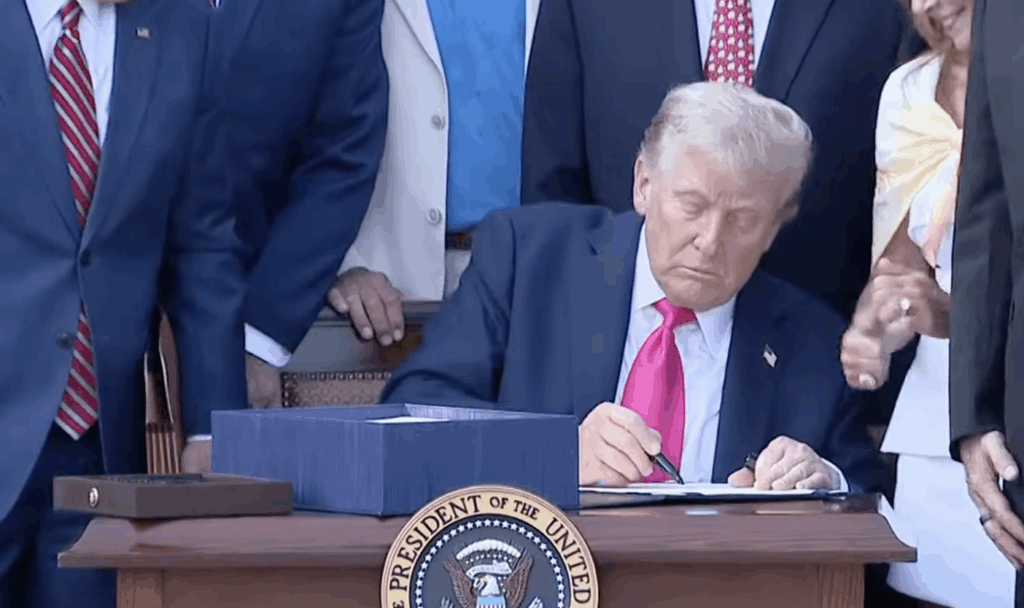The Republican war on the lives of their constituents

The impact of the closing of rural hospitals is literally life-of-death, and one of the central material impacts of Trump’s legislative centerpiece is to accelerate the process:
Eric grew up in this home in Chippewa Falls, Wisconsin. His father, Terry Halfen, poured the cement for the foundation and laid the bricks one by one. When Terry was diagnosed with cancer in late 2023, Eric moved back home to care for him.
Terry was being treated at the nearby hospital, Sacred Heart in Eau Claire, Wisconsin, but it shut down with little notice last year, terminating almost 1400 employees. The city demanded the state open an investigation and called the closure “abrupt and devastating.” But the state never opened one.
“It caused doctors to leave the area,” Eric said. “They didn’t have the proper doctor to do the procedures.”
So every day, Eric drove hours to a hospital farther away — sometimes six hours in a day for multiple trips — to sit by his father’s bedside. This past June, the family finally brought Terry back home. Just 48 hours later, he was gone.
Eric said that had Sacred Heart stayed open, “it would’ve been a lot less traumatic on him.”
While Eric can’t say for certain that it would have helped his father live longer, doctors and paramedics tell ABC News they’ve already seen conditions worsen in irreversible ways — even deaths — because of the region’s shuttered hospitals.
On the same day Sacred Heart closed its doors in Eau Claire, another hospital — St. Joseph’s in Chippewa Falls — also shuttered in neighboring Chippewa Falls because of financial difficulties.
There were only four major hospitals in the region. Now half are gone, sending shockwaves through the community and the rural areas they served.
What’s happened to this part of western Wisconsin is part of a much larger crisis. Across the country, hospitals are vanishing, and a new wave of Medicaid cuts could accelerate the collapse.
President Donald Trump’s Big Beautiful Bill slashes nearly $1 trillion in Medicaid funding over the next decade. The administration says this cuts wasteful spending and will create a $50 billion fund for rural hospitals. But many health experts say that’s not nearly enough.
Already, nearly 100 rural hospitals have closed or eliminated inpatient services in the last decade, threatening health care access to some of the more than 16 million people living in rural communities who rely on Medicaid.
While the full impact of Medicaid cuts could take years to unfold, doctors say the system is already buckling. Many rural hospitals are already operating on razor-thin or negative margins, and they see these looming Medicaid changes could push them over the edge.
And the impact of the reduction of ACA benefits will also hit Republican areas harder:
Democrats in Congress are withholding their votes on a government spending bill to demand that Republicans extend these subsidies, which lower the cost of insurance for people who buy their own health care coverage in marketplaces established by the Affordable Care Act. Since Congress introduced the extra funding in 2021, enrollment has doubled.
These Americans live nearly everywhere in the country, but their numbers are especially concentrated in a handful of red states whose governments have declined to expand Medicaid programs to cover poor, childless adults.
Fifty-seven percent of people with this type of insurance live in Republican congressional districts.
The difference is driven by extra enrollment in states that hadn’t expanded Medicaid since the Affordable Care Act encouraged states to do so in 2014. Obamacare was designed to cover the poorest Americans with Medicaid and then offer subsidies for people who earned more. There is a small share of the income distribution that overlaps; those people are eligible for Medicaid where it is available, and subsidies where it is not. As a result, more low-income Americans are eligible for subsidies in states that don’t offer Medicaid to all poor adults.
Since subsidies became more generous in 2021, overall enrollment has more than tripled in six red states: Texas, Louisiana, Mississippi, Tennessee, Georgia and West Virginia. Of that group, only West Virginia expanded Medicaid.
Obamacare coverage has become especially widespread in south Florida, where there is a large concentration of low-wage workers and early retirees.
Few theories have been disproven harder than “rural voters have shifted Republican because of the material benefits.” Voters are allowed to rank values as they please but most rural voters are committed to a faction that is indifferent to their lives.


